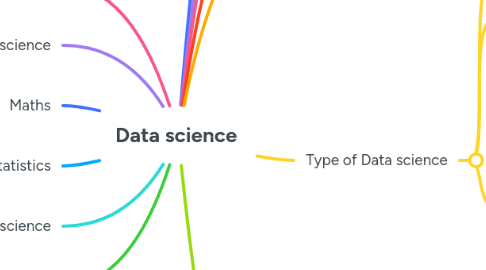
1. Need for Data science
1.1. Understand customer behaviour
1.2. Improve business decisions
1.3. Predict future trends
1.4. Automate task through machine learning
2. Data science is the process of collecting , cleaning , analyzing , visulalizing and interpreting large volume of data to make informed decisions and predictions
3. Domain knowledge
4. Computer science
5. Maths
6. Statistics
7. Evolution of Data science
7.1. Pre-data science era(Before 1960)
7.2. Statistics era(1960-1980)
7.3. Business Intelligence Era(1990-2000)
7.4. Big data and machine learning
8. Need of data science
8.1. data explosion
8.2. better decision making
8.3. Predictive Capabilities
8.4. Real time Analytics
8.5. Automation through AI
9. Data science Life cycle and stages of data science project
9.1. Problem Definition
9.2. Data collection/Data acquisition
9.3. Exploratory Data analysis (EDA)
9.4. Data Modeling
9.5. Model Evaluation
9.6. Deployment
9.7. Monitoring and maintenance
10. Key compenents of Data science
10.1. Data collection
10.2. Data cleaning
10.3. Exploratory data anyalysis
10.4. Data Modeling
10.5. Data Visualization
10.6. Communication
11. Tools and technologies used in data science
11.1. Programming Languages
11.2. Libraries/Frameworks
11.3. Data visualization
11.4. Databases
11.5. Big data tools
12. Applications of Data Science
12.1. Healthcare
12.2. Finance
12.3. E-commerce
12.4. Transportation
12.5. Marketing
12.6. education
12.7. Manufacturing and industry
12.8. Agriculture
13. Type of Data science
13.1. Descriptive Data science
13.1.1. Purpose
13.1.1.1. To summarize Historical data
13.1.1.2. To identify trends and patterns
13.1.2. Tools and techniques
13.1.2.1. data aggregation
13.1.2.2. data visualization(graph, chart)
13.1.3. Example
13.1.3.1. Monthly sales report
13.1.3.2. website traffic analytics
13.2. Diagnostic data science
13.2.1. Purpose
13.2.1.1. To find relationship and correlations
13.2.1.2. To understand causal factors behind a situation
13.2.2. Tools and techniques
13.2.2.1. correlation analysis
13.2.2.2. statistical test
13.2.2.3. data mining techniques
13.2.3. Examples
13.2.3.1. Why did sales drop in march?
13.2.3.2. What caused a spile in customer complaints?
13.3. Predictive Data science
13.3.1. Purpose
13.3.1.1. To predict Future Trends
13.3.1.2. To estimate Probabilities
13.3.2. Tools & Technique
13.3.2.1. Regression analysis
13.3.2.2. Machine learning alogorithm
13.3.2.3. Time-series forecasting
13.3.3. Example
13.3.3.1. Predicting next month's sales
13.3.3.2. Credit score risk prediction
